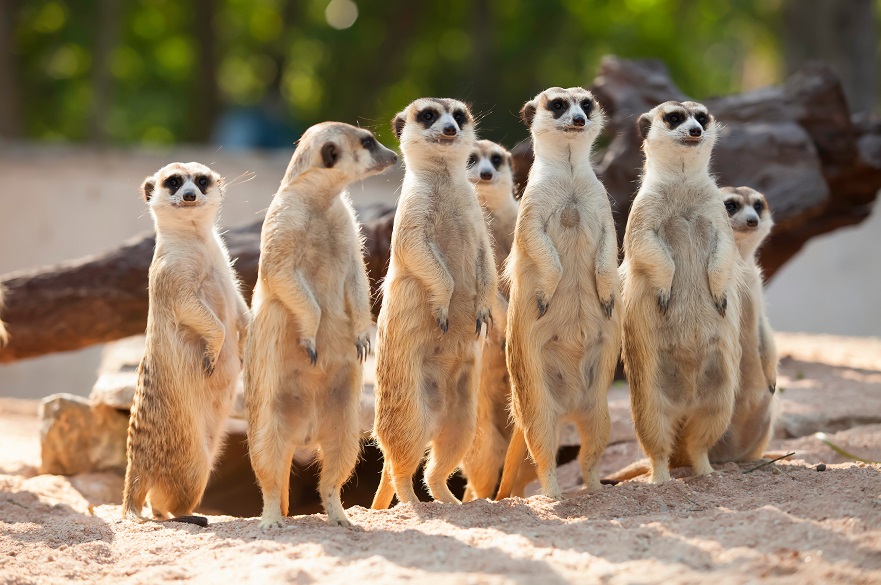Scientists monitor meerkats’ response to returning zoo visitors
Meerkats that may be used to interacting with visitors in zoos responded positively but cautiously to the sudden return of people after the first COVID-19 lockdown ended, a new study suggests.
By Dave Rogers | Published on 1 March 2021
Categories: Press office; Research; School of Animal, Rural and Environmental Sciences;

Experts in animal behaviour at Nottingham Trent University, Harper Adams University and Twycross Zoo studied the behaviour of meerkats at several zoos both during lockdown when there were suddenly no visitors, and then again for a month after zoos reopened to the public.
As part of the pilot study – the first to look at animal behaviour as a result of zoo closures – they found that the slender tailed meerkats showed increased positive social interactions with one another, such as play and social grooming, once visitors returned, and at some zoos there was an increase in positive human-animal interactions too.
Meerkats also showed an increase in ‘alert behaviours’ such as increased vigilance, which the researchers say could be indicative of a natural curiosity in meerkats, particularly after a long absence of seeing visitors.
Visitors are normally a prominent and constant feature in a zoo animals’ environment, with more than 700 million people visiting zoos and aquariums worldwide each year.
Research has previously shown that animal-visitor interactions can be enriching and stimulating for zoo animals, but worldwide closures of zoos during the pandemic led to an abrupt stop in visitor interactions for all species housed.
Since zoo closures were implemented, anecdotal zoo reports have indicated mixed behavioural responses in a number of species, including animals ‘hiding’ from staff due to a lack of people around their enclosures and calling to keepers to attract attention.
“The presence of indicators of positive welfare within the group, including positive social interactions and engaging in positive human-animal interactions, suggest the return of visitors was a positive and engaging experience for the meerkats,” said Dr Samantha Ward, a scientist in Nottingham Trent University’s School of Animal, Rural and Environmental Sciences.
She said: “It’s not always clear how certain animals that are used to humans will react to the changes that we are all currently experiencing but it was promising to see that for these meerkats, they were glad to welcome back the visitors”.
Dr Ellen Williams, a former NTU researcher and now based at Harper Adams University, said: “Meerkats are a popular species in terms of presence in zoos and are considered to be species that visitors are keen to see and are often used as ‘ambassador’ species, coming into close contact with the public through personal experience or encounter programmes.
“This work is extremely important in future evidence-based approaches to the management of zoo animals, such as including consideration of enclosure location and design and ensuring positive visitor experiences which do not negatively impact on animal behaviour and welfare.”
The researchers have further data to analyse and suggest that more work needs to be undertaken over a longer period of time to better understand how certain species adjust to zoo visitors and the true nature of the effects of visitors upon animal behaviour.
The study, which also involved NTU’s Dr Anne Carter and Twycross Zoo’s Dr Jessica Rendle, is published in the journal Applied Animal Behaviour Science.
Notes for Editors
Press enquiries please contact Dave Rogers, Public Relations Manager, on telephone +44 (0)115 848 8782, or via email.
Further information about the project is available at https://zooanimalresearch.wordpress.com/.
NTU was named University of the Year 2019 in the Guardian University Awards. The award was based on performance and improvement in the Guardian University Guide, retention of students from low-participation areas and attainment of BME students. NTU was also the Times Higher Education University of the Year 2017, and The Times and Sunday Times Modern University of the Year 2018. These awards recognise NTU for its high levels of student satisfaction, its quality of teaching, its engagement with employers, and its overall student experience.
The university has been rated Gold in the Government’s Teaching Excellence Framework – the highest ranking available.
It is one of the largest UK universities. With nearly 32,000 students and more than 4,000 staff located across four campuses, the University contributes £900m to the UK economy every year. With an international student population of more than 3,000 from around 100 countries, the University prides itself on its global outlook
The university is passionate about creating opportunities and its extensive outreach programme is designed to enable NTU to be a vehicle for social mobility. NTU is among the UK’s top five recruiters of students from disadvantaged backgrounds and was awarded University of the Year in the UK Social Mobility Awards 2019. A total of 82% of its graduates go on to graduate entry employment or graduate entry education or training within six months of leaving. Student satisfaction is high: NTU achieved an 87% satisfaction score in the 2019 National Student Survey.
A total of 82% of its graduates go on to graduate entry employment or graduate entry education or training within six months of leaving. Student satisfaction is high: NTU achieved an 87% satisfaction score in the 2019 National Student Survey.